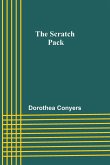In "The Scratch Pack," Dorothea Conyers delves into the intricate dynamics of societal relationships and personal identity within a tightly woven narrative structure. This novel, published in the early 20th century, employs a vivid prose style that reflects the nuances of both the characters' inner lives and the external pressures they face. Conyers expertly utilizes a blend of sharp dialogue and descriptive passages to explore themes of ambition, betrayal, and self-discovery, all set against a backdrop of shifting social mores. The book is often regarded as a significant contribution to the exploration of women's roles in modern society, making it a pivotal text within the literary movements of the time, particularly the rise of feminist literature. Dorothea Conyers, a contemporary of notable authors such as Virginia Woolf and Katherine Mansfield, was deeply influenced by the changing landscape of gender roles in her era. Her own experiences as a woman navigating a male-dominated literary world undoubtedly informed her characters' struggles and aspirations. Conyers's keen observations of societal expectations and her commitment to portraying authentic female experiences illustrate her role as a forerunner in women's literature. For readers seeking a profound examination of the interplay between individuality and societal expectation, "The Scratch Pack" offers both a compelling story and a rich historical context. Conyers's deft storytelling and incisive social commentary provide a rewarding experience for those interested in early feminist narratives and the complexities of human relationships.
Bitte wählen Sie Ihr Anliegen aus.
Rechnungen
Retourenschein anfordern
Bestellstatus
Storno








